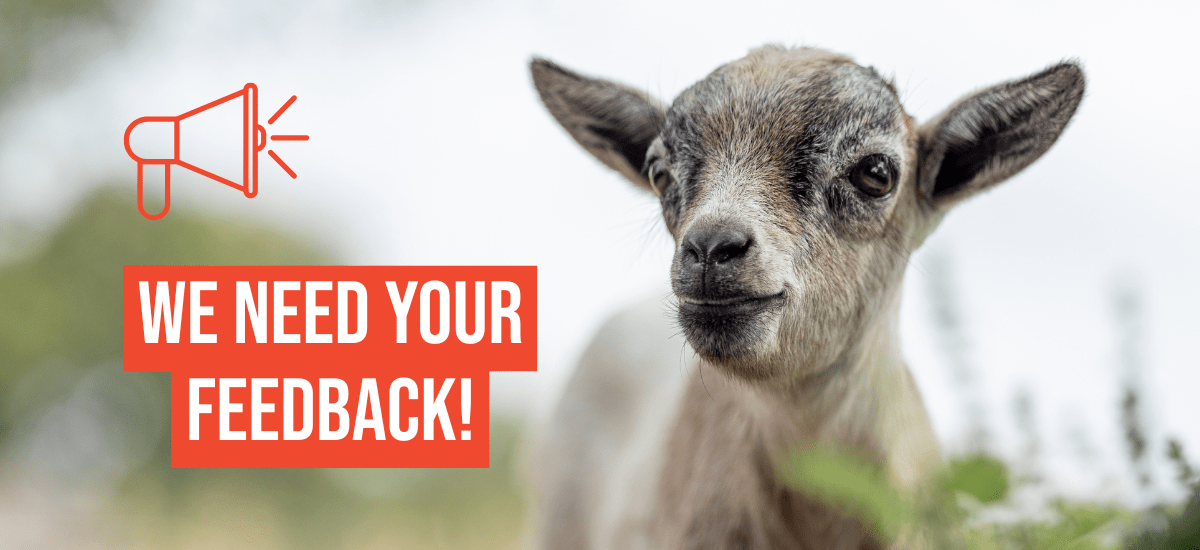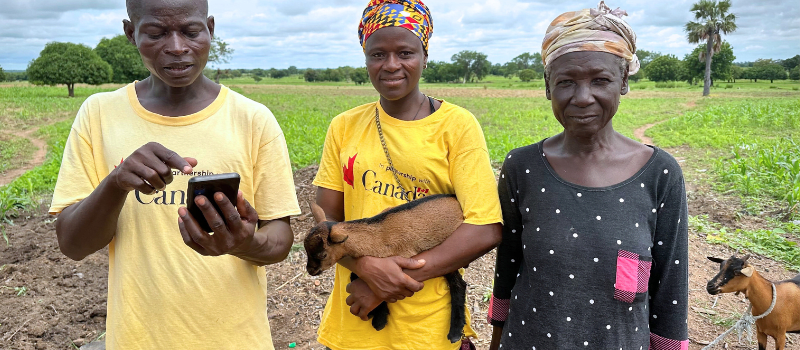
(from left to right) VWB Canadian volunteers Kaitlyn Lawson and Elyse Perrault, local farmers Martha and Stephen Kaaria from Wega Society, and VWB national volunteer and gender specialist Patricia Kanyiri pose for a picture after harvesting sweet potatoes from Kaaria’s farm.
Elyse Perrault and Kaitlyn Lawson are third year veterinary students attending the Ontario Veterinary College in Guelph, Ontario. Over May to August of 2022, the students volunteered with Veterinarians Without Borders (VWB) Canada in Meru, Kenya. Patricia Kanyiri is a gender specialist that worked alongside Elyse and Kaitlyn to provide trainings to smallholder dairy farmers on women’s economic empowerment and gender equality.
VWB has only recently expanded their work to the Meru Dairy Cooperative Union in Meru and utilizes a One Health approach to provide dairy cooperative extension officers and smallholder dairy farmers with trainings that will improve human, animal, and environmental health. This is done by exploring topics related to the health and nutrition of dairy cattle, as well as gender equity and financial empowerment of farmers. Most of the farmers that the volunteers visit have one to three cows and they can often be their main source of income. The hope is that by improving dairy cow health and well-being, milk quality and production can increase which will contribute to improving the livelihoods of their farmers.
Throughout their placement, Elyse and Kaitlyn had the opportunity to meet with many farmers who all exemplified the immense effort it requires to maintain a successful smallholder farm. When the students met with Martha and Stephen Kaaria, it was clear to them that the farmers demonstrated a particular interest in the project and were able to show first-hand their willingness to implement positive change on their farm. The couple have taken turns attending trainings offered by the Meru Dairy and VWB. Furthermore, the pair has already began implementing their new knowledge and skills acquired from the trainings, with the goal of improving their dairy farm’s production. Martha and Stephen have received trainings that focused specifically on mastitis and reproduction, milking cow nutrition, cow comfort, calf rearing and economic empowerment. Stephen mentioned that Martha attended many of these sessions and would return to their farm to teach her husband everything she had learned. They have now mentioned that they will try to attend future sessions together, while Stephen specified “you cannot do this alone, you have to work together” with respect to couples bettering their farms. Martha also added, “the trainings have empowered and enabled me to be more involved in decision making on our finances within the farm and in the household.”
Prior to attending trainings offered by the Meru Dairy and VWB, peak production of the two cows at Martha and Stephen’s farm averaged 14 L/day per cow. Now, approximately 6 months later, peak production per cow averages between 18-25 L/day. When visiting their farm, it was clear that the couple is extremely passionate about making improvements. Since their last visit two weeks prior, Elyse and Kaitlyn noticed that the couple already implemented what they had explained about cow comfort. Stephen and Martha had improved the cow stalls by adding more bedding that was soft, clean, and dry. They also removed a neck rail that was placed too low and was affecting the cow’s ability to lie down by limiting lunge space.
The couple is equally passionate about providing good quality feed to their cattle, with Stephen stating that “feeding is the most important task of a farmer.” Elyse and Kaitlyn immediately noticed that the cows were in great body condition and had no doubt that this contributed to the large rise in milk production recently. When questioned on what their cows receive as feed, Stephen proudly explained that they have been producing corn/maize silage for the last year. He explained that the trainings made the couple realize the value of silage production because it allows them to have good-quality feed available year-round. This is especially important in their region where farmers struggle with drought and crop failure. Moreover, Stephen stated that the trainings helped himself and Martha make the decision to start planting improved hybrid and nutrient-dense fodder such as Panicum, Brachiaria, and Mulberry trees. They also made the choice to intercrop native Kikuyu grass, coffee, and sweet potatoes. This allows the couple to efficiently use their farm to produce feed for cattle and human consumption alike. For example, while sweet potatoes are nutritious for humans, the sweet potato vines are an excellent source of protein and energy for cattle.
Martha and Stephen Kaaria also discussed their goals for the future and are eager to continue working together to make effective changes on their farm. Stephen emphasized “you have to plan ahead for your farm”. As an example, the couple recently acquired two additional acres of land, where they decided to plant more maize for silage production. The couple discussed that they plan much of their crop production based on what can be used to feed their cattle. They hope that improving cattle nutrition will result in increased milk production, and subsequently a rise in revenue that they plan to put back into their farm to increase their maize production for future silage.

Martha and Stephen Kaaria standing amongst some of the crops they are growing for cattle feed, including Brachiaria, Panicum, and Mulberry trees.
While the couple credits trainings they have received to be a major driver for their focus on cattle nutrition, some lessons were also the result of a recent tragedy. One of their newly purchased high-producing cows recently died acutely and contaminated feed was the suspected cause. To prevent contamination from poisonous critters, the couple now allows any harvested plant material to dry for a minimum of 24 hours before being used for feed. As taught in certain VWB trainings, this is also an effective strategy to allow ticks to escape and reduce the incidence of tick-borne diseases affecting cattle.
Finally, the VWB project is also committed to participatory and inclusive approaches to development by selecting members of various societies to act as Community One Health Champions (COHC) who will continue to spread knowledge once the project is complete. Stephen exemplified the importance of COHCs when he said “this area does not care about training much. They think it is a waste of time, but I am working to help mobilize people because I have found it so helpful.” He further explained that “people do not care because they do not know about the benefits of the training. But, knowledge is power.” Stephen also mentioned that he tells other farmers in the community to come to the trainings as husband and wife because “if only one partner comes, they may miss some important information.”
Martha and Stephen Kaaria are a prime example of how the work being carried out by the Meru Dairy and VWB can significantly improve the livelihoods of farmers by building their capacity through the acquisition of knowledge. They also demonstrate how when a couple works together, both individuals can be empowered economically to further increase household income together. In turn, this allows them to better nourish themselves and their children as well as participate in household and community-level decision making as a pair.
Stephen mentioned that he hopes that the Meru Dairy will continue to visit more frequently as this will help farmers to remember more information via repetition so that they can better put it to use on their farms.

VWB volunteer Elyse Perrault touring the shamba and discussing crops with Stephen Kaaria.
One of two cows owned by Martha and Stephen Kaaria. She is clean, in good body condition, and is 8 months pregnant!
Martha and Stephen Kaaria from Wega Society showing some of their maize silage, which is fed to their cows on a daily basis.
(From top to bottom) VWB national volunteer and veterinarian Dr. Remmy Mugambi, VWB national volunteer and gender specialist Patricia Kanyiri, Esther Kagwiria (their neighbour) and Stephen Kaaria discussing the successes of Martha and Stephen Kaaria’s farm while overlooking one of their two cows.
Implementing partner: Meru Dairy Cooperative Union
Authors: Kaitlyn Lawson, Elyse Perrault and Patricia Kanyiri





